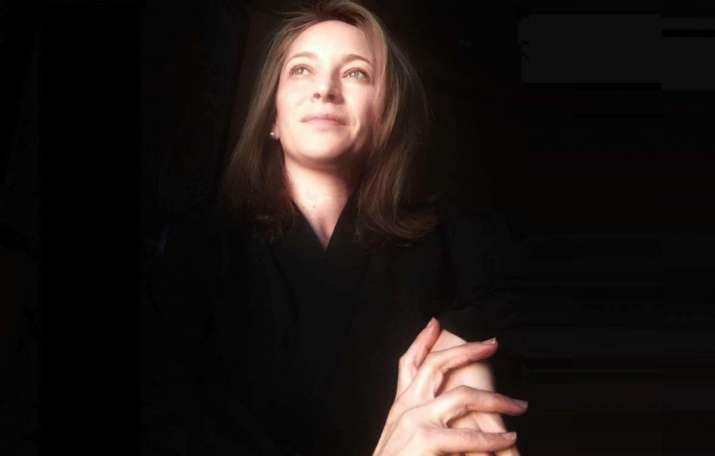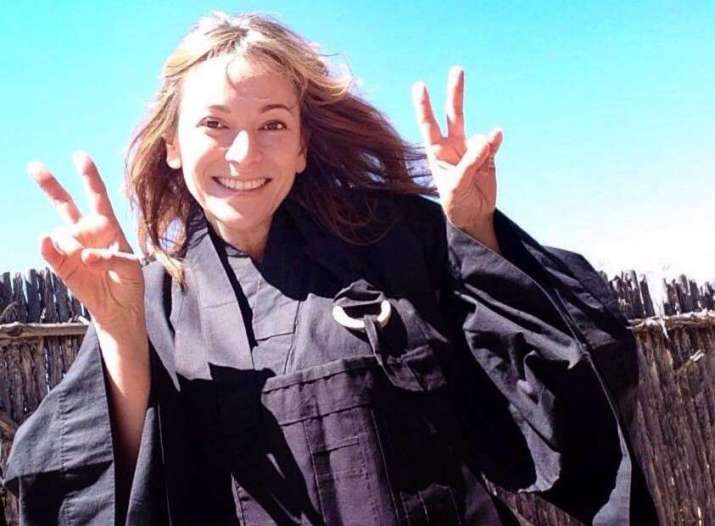FEATURES|THEMES|People and Personalities
Courage and Compassion: Johanne Lauktien and Remedial Yoga for Cancer Patients
 Johanne Lauktien. Image courtesy of Johanne Lauktien
Johanne Lauktien. Image courtesy of Johanne Lauktien“I’m not a cancer survivor,” is one of the first things Johanne Lauktien feels compelled to tell me, because she teaches remedial yoga for cancer patients and survivors. This often emotionally challenging career has been her calling for the past few years, during which she went on a multifaceted spiritual journey and emerged a changed person. Her Instagram account, as well as her Facebook page, reveal a holistic health instructor passionate about engaging with life fully.
Johanne was conferred the Dharma names Jakunen, given to her by Roshi Joan Jiko Halifax upon receiving the precepts (jukai) at Upaya Zen Center in Santa Fe, New Mexico, and Könchok Yangtso Zangmo, which she received when she became a student of Garchen Rinpoche. She is the founder of Yoga Instruction & Healing for Cancer Survivors in Scottsdale and Phoenix, Arizona. When teaching cancer patients, she focuses on regaining strength and flexibility, correcting postural deviations, improving lymph flow, and alleviating swelling and inflammation that are the result of surgery or side effects of other treatments.
She currently manages a remedial yoga program at the Banner MD Anderson Cancer Center in Phoenix, Arizona. This therapeutic series, called the Yoga Survivorship Series, is based off her Hatha, Ashtanga, and Iyengar training, combined with teaching methodologies from her study at Upaya Zen Center.
Johanne was born into a Catholic family in Mexico. Her Christian childhood acquainted her with silent retreat and altruistic pursuits, although her education didn’t offer satisfactory answers about the nature of death. She studied at one of Mexico’s best schools, and in 20 years built a very successful career for herself in the manufacturing industry, working with several large multinationals at the executive level.
Her life changed when she married a Jewish-American husband and Johanne converted to Judaism out of a deep love for her spouse as well as a profound disillusionment with institutional Catholicism. Being married to an American rendered her, due to US immigration policy, unable to continue working for several years upon moving to the United States. When they moved to London, Johanne wasn’t allowed to work either, as visa complications there prevented her from getting a job. Tragedy struck when she suffered a miscarriage, and a couple of years later she and her husband divorced. It was a painful time, although she had the strength of character to not only carry on but also to appreciate the fact that there were many with far graver problems than her own.
“Through my yoga classes at the Sivananda Yoga Vedanta Center in London, I came into contact with yoga therapy for stress management,” Johanne says. She was fascinated by how some nurses practiced yogic meditation and breathing techniques to cope with their often-stressful working environment. She later went on to explore how yoga could be therapeutic in various other contexts, for instance when one is suffering from depression, arthritis, limited mobility, and, most notably, cancer.
 Johanne Lauktien. Image courtesy of Johanne Lauktien
Johanne Lauktien. Image courtesy of Johanne LauktienUpon her return to the US, Johanne entered the Yoga for Survivors program, created by Laura Kupperman, at the Yoga Workshop in Boulder, Colorado. Richard Freeman and Mary Taylor, an acclaimed yoga teacher couple, founded the Yoga Workshop in 1987. Taylor was part of the faculty for the cancer training, but Johanne trained under Freeman in the program, Yoga Practice in the Mirror of Buddhism. Bit by bit, Johanne began to ease into the role of a yoga teacher for cancer patients herself, providing classes at Sylvester Comprehensive Cancer Center in Miami. The Health System, Integrative Medicine at Sylvester Comprehensive Cancer Center at the University of Miami also invited her to give classes at the intensive care unit. In 2014, she began to work with patients’ secondary effects, and transitioned from giving one class every fortnight to three classes a week.
“The ICU’s patients change all the time, as you can imagine with a cancer prognosis. Some are fortunate, but not everyone will survive,” she tells me. “I also feel distress in such volatile, uncertain situations. But there are two sides to the emotions shared between patients and remedial teachers: there is also the feeling of hope and peace. It’s impermanence embodied.”
This was the period that Johanne decided she needed tools to cope with the work she was doing, especially with how to “be” and support others with skillful means. “I wanted to train with spiritual teacher Ram Dass in his program Dying into Love and that’s how I came to know about Roshi Halifax. She was in a video with Ram Dass as one of the teachers. Immediately, I researched her and her center, Upaya Zen Center, and to my surprise Mary Taylor was part of the faculty for Being With Dying program at Upaya. I didn’t think twice, I bought a ticket and attended the program.”
Her experience at Upaya Zen Center in 2015 was transformative. She describes, “I fell in love once again though this program, but with Buddhism, so after I returned to Miami, I applied for the one-year residential training, and started living there in September 2015.” Her one-year residency allowed her to be certified in a methodology called G.R.A.C.E., a program for cultivating compassion while interacting with others taught by Roshi Halifax.
“Practicing loving-kindness meditation taught me a new concept called ‘intentionality in attention.’ We need to notice how we speak and how we listen,” she notes. “Mindfulness of our motivation keeps us on track. It might sound simple but it’s a work in progress, 24 hours every day for the rest of our lives. It’s so easy to be unregulated.” This model has five elements:
Gathering attention: focus, grounding, balance.
Recalling intention: the resource of motivation.
Attuning to self/other: affective resonance.
Considering: what will serve.
Engaging: ethical enactment, then ending.
During the residency, Johanne relinquished much of the lifestyle she was used to as a corporate executive for days spent meditating and housekeeping. She remembers the gardening grounds at the center the most vividly: “The compost was needed but it had this really bad smell,” she recalls, laughing. “That was my lesson right there. I was confronting disgust. I saw how openness actually meant being resilient. And I saw the cycle of interconnectedness in how decaying compost becomes part of the earth and nourishes future corn, beans, and squash planted in our Windmill Garden, which will feed us in turn.”
Since the end of her residency in 2016, Johanne has continued to teach and believes that meditation and silent retreat have played crucial roles in her own spiritual journey. Currently, her vocation is caring for those suffering from a condition typically seen as ravaging and debilitating, couched in negative terms like “malignant” or “fatal.”
“I’m still learning how to face pain and suffering in the world. I’m fortunate that my family have been supportive. Ultimately, my vocation is to serve patients,” she says. “Through mindfulness techniques and cultivating compassion, people will be able to be present for joy and suffering, transforming their relationship with cancer.”
See more
Related features from Buddhistdoor Global
Healing the Wounds of War with Love and Compassion
Thabarwa Centre — A Refuge for the Homeless in Myanmar














